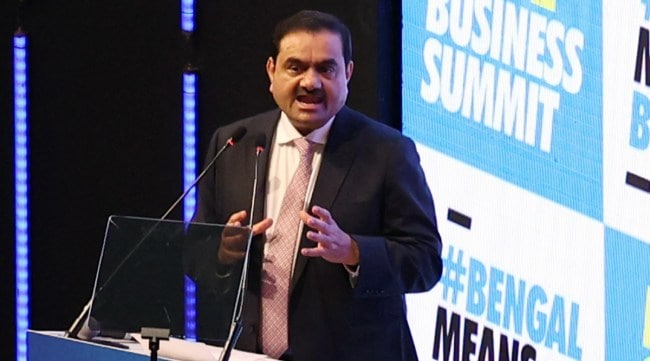Opinion How Gautam Adani punctured political slogans of both Rahul Gandhi and Narendra Modi
In one seemingly innocuous stroke, the richest Indian managed to highlight the myopia of 'suit-boot ki sarkar' and raise questions about 'sattar saal mein kucch nahi hua' and claims of the 'Modi Model'
 Adani Enterprises fell 2.5 per cent but pared some losses after the statement to trade at 1.5 per cent lower at 1350 hrs. (Express File Photo)
Adani Enterprises fell 2.5 per cent but pared some losses after the statement to trade at 1.5 per cent lower at 1350 hrs. (Express File Photo) Like all bonds of unconditional affection, sibling love can be blinding. Political rhetoric, on the other hand, aims to blind.
In Priyanka Gandhi Vadra’s (PGV) first statement on the Bharat Jodo Yatra trail, there are elements of both of these factors. She praised Rahul Gandhi for walking 3,000 km, braving the North Indian winter in “just a t-shirt” as well as withstanding a consistent onslaught on his personality and character from the ruling party and its larger parivar. He is also a “warrior”, armed with the “shield of truth”. There is indeed much that is commendable in the Bharat Jodo Yatra as a political exercise, and perhaps more importantly in its larger moral idiom – the hyperbole notwithstanding. But the now viral remark that is perhaps the most political part of the statement is PGV’s implication that Big Business is being resisted only by the MP from Wayanad: “Ambani and Adani bought political leaders, they bought PSUs, they bought the media, but they couldn’t buy my brother. They will not be able to either.”
PGV’s statement is of a piece with the simplistic slogan that has marked Congress’s — and more specifically Rahul’s — attacks on the BJP. Since January 2015, when Prime Minister Modi wore a monogrammed suit to his meeting with then-US president Barack Obama, Rahul Gandhi has hurled the “suit-boot ki sarkar” jibe at the government at regular intervals. This slogan has been accompanied by insinuations and direct attacks on “Adani-Ambani”, with the former now getting more attention as the third-richest (or somewhere thereabouts – when you’re that wealthy, what’s a billion here or there?) man in the world. In a speech in the recent election campaign in Gujarat, Rahul insinuated that the central government was in the pocket of the plutocrat.
Yet, just days before PGV made her impassioned speech about the unique incorruptibility of her brother, Gautam Adani made it clear that almost every government since 1989 — certainly since economic liberalisation — has been a “suit-boot ki sarkar” of sorts.
In an interview to India Today, the richest Indian had few tough questions to answer. But, when he was asked about the widespread perception that the phenomenal rise in the fortunes and spread of his holdings is linked to the ascendancy of Narendra Modi, Adani was generous in giving credit. The first big break for his business was thanks to Rajiv Gandhi, “who liberalised the Exim (export-import) policy, and for the first time several items were brought into the open general list”. Adani added that “it helped me start my export house. But for Rajiv Gandhi, my journey as an entrepreneur would never have taken off.”
He also credited former prime minister P V Narasimha Rao and then finance minister Manmohan Singh, both from Congress, for economic liberalisation, which gave his business the “second big push”. Unsurprisingly, the billionaire also credited Modi’s tenure as CM of Gujarat for his success. But he was also effusive about Keshubhai Patel.
In sticking to the “Ambani-Adani sarkar” — and now saying that everyone else in public life and associated professions have sold out — in the aftermath of the interview, the Congress leadership has made an error.
By giving credit to leaders who preceded the current PM, Gautam Adani has, likely inadvertently, done two things. First, he has punctured the notion that the Modi government is the first one to be partial to big capital — directly undermining the “suit-boot” slogan. Secondly, and more significantly, he has put paid to an idea that has been repeated ad infinitum since the results of the 2014 general elections: That “sattar saal mein kuchh nahi hua”, and that India’s economic successes are somehow a result of the “Gujarat” and “Modi” model, and its failures a legacy of Congress and coalition governments.
The Bharat Jodo Yatra, thus far, has arguably been Rahul Gandhi’s most successful political intervention. Its core theme appears to be one of inclusivity at a time when majoritarianism, even bigotry, is the dominant force. The fact that he has stuck to his message from Kanyakumari to Delhi, and likely beyond, shows a political and ideological consistency that has not been a hallmark of the Congress leader’s career so far. That message is diluted by attacks on big business. After all, Congress hasn’t even paid lip service to the idea of socialism in decades. Perhaps that’s why its attacks on business houses — which found their first taste of success during Congress rule — ring a little hollow.
On the other hand, the Grand Old Party can justifiably lay claim to policy interventions that unleashed the animal spirits of both entrepreneurs and consumers. In fact, Adani’s comments could have been used to poke holes in, or even rhetorically diminish, the BJP’s claims of running a pro-business government. Alternatively, rather than reductive sloganeering, the Congress leadership could have used the opportunity presented to them by Adani to showcase the difference between monopoly and crony capitalism and create an enabling environment for businesses to thrive.
Adani’s comments also hold a lesson for the BJP and the central government. The idea that (New) India began in 2014 is a limited one. While the “sattar saal” slogan had a political cache, even those seen as close to the government acknowledge that there are others who have a share in their success. Just as the BJP’s politics of religious majoritarianism is dangerous for a plural society, its refusal to engage with the notion that much good was done in India by other political forces can stop it from learning the best lessons from our recent history.
Gautam Adani, the man now often accused of being a partner in the cosy duopoly of the Indian private sector, managed in one seemingly innocuous comment to shatter the myopia of both the Opposition whose slogan denigrates him, as well as the PM and the ruling party, who want the country to be “mukt” from the party whose leaders made the richest Indian’s rise possible.
aakash.joshi@expressindia.com




